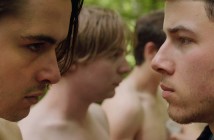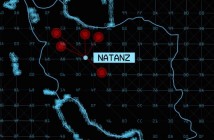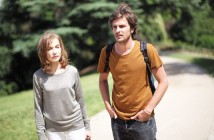Editor’s Notes: The following interview of our coverage of the 2015 Berlin International Film Festival. For more information on the festival visit http://www.berlinale.de and follow Berlinale on Twitter at@berlinale.
Mina Walking, director Yosef Baraki’s first feature film, tells the story of Mina, an impulsive twelve-year-old Afghan street seller saddled by a senile grandfather and a neglectful father, who sees her future slipping away when she is forced to neglect her education and walk the streets of Kabul to support her fragmented family. In the seven days that follow her life, Mina’s quest to emancipate her father from the claws of a local drug dealer and her attempt to secretly attend school underlines the current struggle of a young generation of Afghans trying to shake off the echoes of oppression from the Taliban ear that continues to haunt those who bore witness to it.
Next Projection: Mina Walking just had its premiere here at Berlinale. How did you feel after the first public screening and what does it mean for you to show your film at this particular festival?
Yosef Baraki: First of all, I guess the best way to describe it is being a little overwhelmed because I find myself not being able to process the fact that it played already. Showing Mina Walking in Berlin means everything to me because this movie was made to be seen by many people because the subject of the movie is based on something that a lot of people don’t have access to, such as images or testimonies of real life in Afghanistan or personal lives of Afghan people. And the fact that it is playing in Berlin is just amazing. The Berlin International Film Festival is my favorite festival. Before the movie was even in development and just an idea, my producer asked me where I wanted to premiere the movie and I said Berlin. The festival has opened the door to so many Middle-Eastern films and filmmakers before me and that’s why I feel like Berlin is the perfect place to premiere Mina Walking.
NP: What’s your story behind the story of Mina Walking? How did you get inspired and involved in this project?
YB: I spent most of my life in Canada, but I’m originally from Afghanistan and my father grew up there. He always talked to me about Afghanistan when I was little. He told me stories about his life and his culture and I also grew up with this culture. Later on I started visiting Afghanistan. Through my travels I met these groups of street children. There are thousands of them just in Kabul alone and what makes this story important to me is, there are so many children out there who are living this existence that Mina is living in the movie. I particularly met this group of four street children who would sell outside government buildings. What I noticed and eventually led to writing this movie was the dynamic between them. In a country like Afghanistan it was interesting to see that the girls were making more money than the boys and were able to outsmart them. These children spent such a long time on the streets every day and didn’t go to school, either because they were orphaned or because war has affected their parents in a way that the children had to support the family. I tried to imagine what a girl’s life would be like once she gets home after work and that’s what inspired me.
NP: You shot the whole film on location in Afghanistan. Did you come upon any difficulties during filming?
YB: I shot all of the movie in Kabul and I shot it with a small camera for a specific reason. Shooting on the streets of Kabul is not an easy thing and not necessarily for safety reasons, but there are many people and people in Afghanistan love cameras. I was trying to go for real-life situations and I hid the camera and wrapped it in my scarf or my clothes and follow Mina that way without the camera being visible. Sometimes I would climb onto the roofs of buildings and shoot down with a long lens to capture Mina at the market without being seen. If there were too many people on the street, we would reduce the number of our crew if we were too noticeable. We were trying to blend in because we had to move forward, due to our tight budget and our short schedule. We could not afford to being told we can’t film somewhere, so we had to improvise.
NP: Speaking of improvising. How much of the film was scripted and how much was improvised?
YB: Going into Afghanistan I knew I couldn’t necessarily write a full script because I was not sure I would get actors who would be able to memorize lines and because I didn’t know if I would get access to certain locations. What I did was, I wrote a treatment of what I thought the story should be and I brought that over to Kabul and I rehearsed with Mina a little bit. What ended up happening was I took most of the stuff from the treatment away in the editing stage and I replaced it with all the improvisation. I shot maybe thirty to forty percent of what I had written and the rest was just things that were happening to us. I would place Mina in a situation and she would react and I would film her in that situation. There is a scene with Samir’s father feeding pigeons on his roof and that was completely improvised and we incorporated that into the story for example. All these improvised scenes are very important to me because these are not scenes that I had written, therefore they ring true to me. For some reason I always have trouble with liking my own writing and being able to improvise and being able to capture all these spontaneous moments was really good. In the editing stage I put all that spontaneity into the movie because that felt true to me.
NP: Not only did you write the script, direct and edit the film but you also did the cinematography for it. Which part did you enjoy the most?
YB: I think every stage had very terrible moments I suppose. The writing is always tough because you are sitting there alone and you don’t know if your writing is any good but you get through that. And then there is the editing. The first days of editing I was thinking: “This is not going to work. What am I doing”? But eventually it worked. I think the one thing that was always constant for me was directing and interacting with people, managing the set and trying to capture real-life moments. That’s what I enjoyed the most. I felt like being in a very privileged position. To be able to be holding a camera in a country like Afghanistan and to be able to capture reality, I felt a responsibility to portray the country and the people correctly. As a director having this opportunity, I really wanted to use it to its full potential, to go out there and to capture things that maybe have not been captured before and to film on streets that have never been filmed and to interact with local people who had never seen a camera or a film before. Directing was the most enjoyable part of the process because it offered me to meet new people and to capture moments. I almost felt like an explorer in a way.




